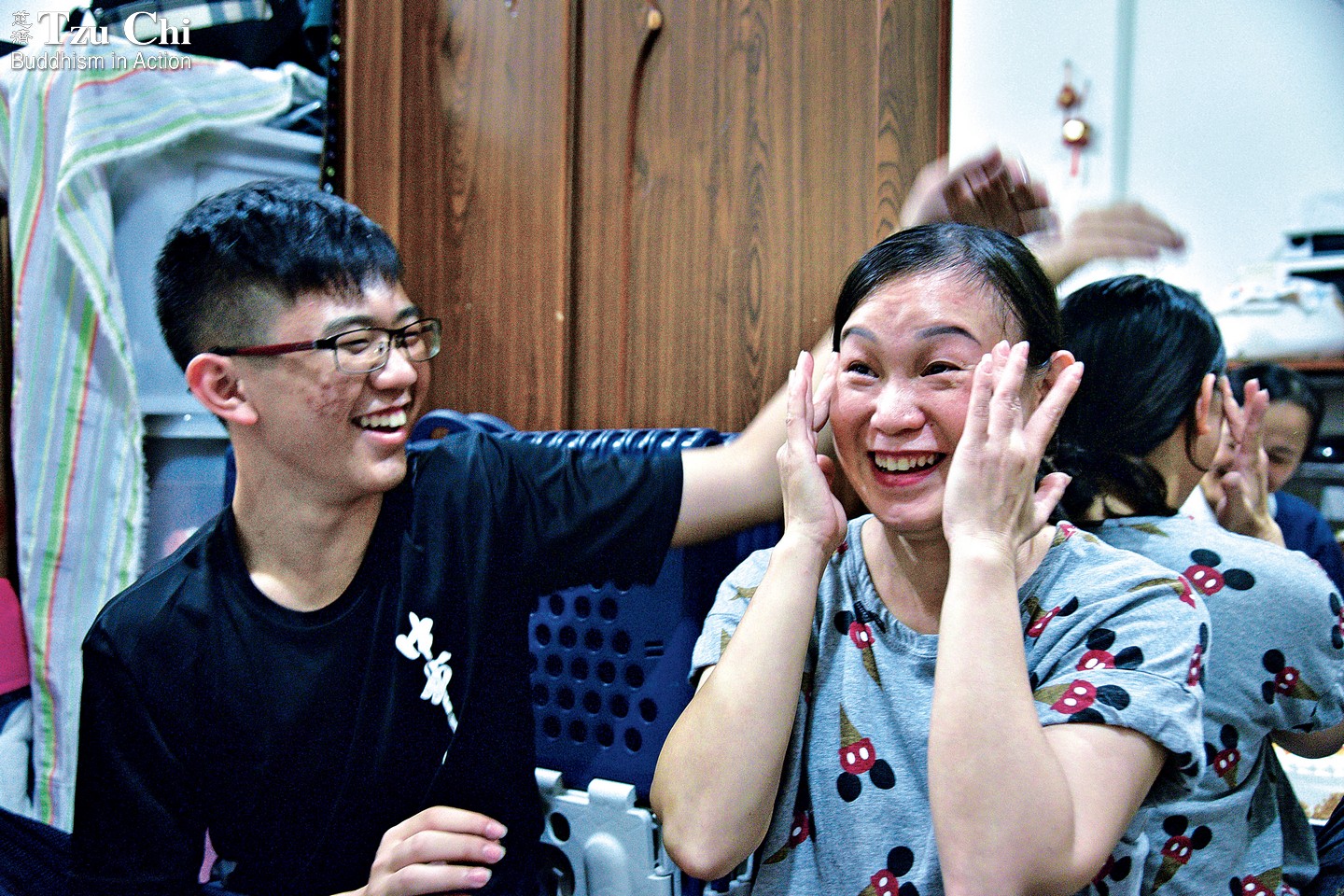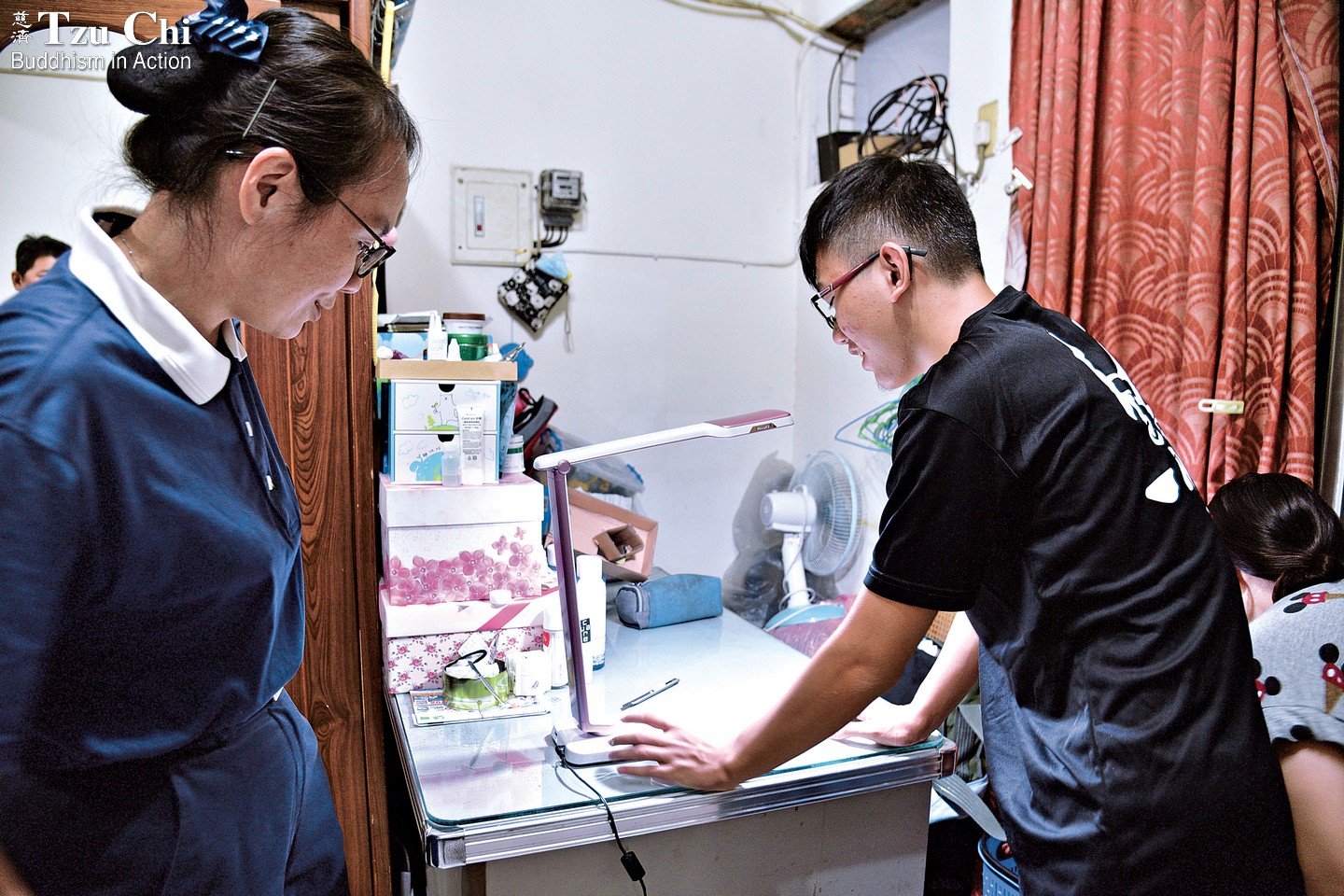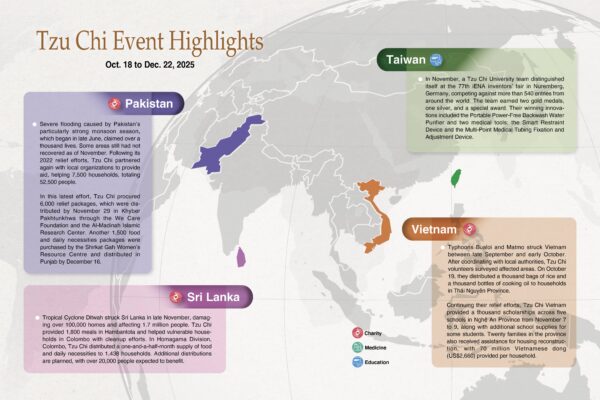By Zhang Li-zhu
Translated by Rose Ting
Photos by Chen Li-xue
A-zhi’s mother has raised him alone since his father passed away. A-zhi knew that being a single mother wasn’t easy, and he was determined to help his family climb out of poverty and give his mother a good life.

A-zhi (left) repays his mother’s love by applying himself in school and helping out with chores around the house. His mother is happy she has a great son.
Mom, why don’t you remarry?” the boy asked.
His mother pondered this mature question from her young son, and then she responded: “Having experienced the pain of losing the man I love, I can’t bear to go through that pain again.”
This was a dialogue between A-zhi and his mom, Giang (not their real names). He had asked her about remarrying because she had rarely smiled since his dad passed away. A-zhi reasoned that if he had a father and she a husband, she might begin to smile again. He just wanted her to be happy.
A kitchen with a view
Giang and A-zhi live on the top floor of a four-story apartment building in Daya District, Taichung City, central Taiwan. Their home is very small, only 107 square feet, into which is crammed a bed, a desk, and other basic furniture and household items. There is no room for a private bathroom, so they share a communal bathroom with the families living downstairs.
The one-room apartment has a small balcony, which doubles as their kitchen. Because it’s outside, the kitchen has no cover and is exposed to the elements. A recycled gas stove sits in a corner of the balcony, but it doesn’t work very well—the flame is low and requires fanning to get it going full blast.
Despite the primitive setup, Giang is optimistic and tends to look at life’s hardships with a positive attitude. “Cooking here [on the balcony] is nice,” Giang said. “You can see the stars in the evening, and it’s cooler out here. I can just pop my head out to check if my son is returning home from school. There are many benefits.”
“What if it rains?” several visiting Tzu Chi volunteers asked in unison.
A-zhi quickly responded by producing something that looked like a small electric hotplate. “We have an induction cooker,” he said. “When it rains, we can just go inside and use it to cook some noodles.”
Giang and A-zhi live a simple life and take care of each other. They seem to be content with a roof over their head and each other to rely on. The mother keeps their home spotless, and the son never complains about not having enough money. They are a living example of Master Cheng Yen’s saying: “It’s better to have a broad heart than a spacious house.”
Giang is originally from Vietnam, but she moved to Taiwan after getting married. When her husband died of cancer, the burden of supporting her family fell on her shoulders. She became so busy making a living she even stopped going to church. When people at her church learned about her situation, they referred her to the Tzu Chi Foundation for help. That was back in 2011, eight years ago. Since then, the foundation has provided her and her son with a monthly subsidy as well as emotional support and care. During this time, volunteers have witnessed A-zhi grow from a second-grader to a high schooler.
A considerate son
In The Twenty-Four Paragons of Filial Piety, written during China’s Yuan dynasty (1271-1368), there is a story about a young boy named Huang Xiang (黃香). In this folk tale, Huang lost his mother when he was nine, but he continued to take good care of his father. During the hot summer season, he made a point of fanning his father’s bed at night to cool it for his father to sleep on. During the cold of winter, Huang warmed his father’s bed with his own body heat so his father could have a warm bed on which to fall asleep comfortably.
Though this folk tale is very old, A-zhi has brought it to life. The apartment he and his mother share is so small that there is room for only one bed. Each night, one of them, mother or son, gets the bed and the other gets the floor, with a piece of fabric in between serving as a partition. A-zhi always volunteers to sleep on the floor in winter so that his mother can sleep on the bed and stay warmer, whereas in summer he chooses to sleep on the bed and leaves the cooler floor for his mom to sleep on. Like Huang Xiang in the story, A-zhi is a good son and demonstrates exemplary filial piety.
Giang said emotionally that she used to be so busy working she didn’t have time to pay much attention to people around her—including her son. But that changed one day when she came down with the flu. She was running a fever of 40 degrees Celsius (104 degrees Fahrenheit), and A-zhi lovingly cared for her by applying a cold compress to her forehead and plying her with water. He kept tabs on her temperature by repeatedly feeling her forehead with his hand. A-zhi lavished care on her and showed the love of a devoted son. That’s when she realized: “How nice it is to have a son!” It’s no surprise that Giang is all smiles when she talks about her son.
She added that A-zhi was always more mature than other children his age growing up. When he was in kindergarten, his school organized a field trip and invited parents to participate. Because she had to work that day, she couldn’t decide whether to join the trip or not. A-zhi told her, much like an adult: “Mom, you’ll always have time to make money, but my childhood will only happen once. Once it’s gone, it’ll be gone forever.” After receiving such wise advice, she decided to attend the field trip. In fact, she never missed her son’s activities after that when parental participation was encouraged.
A mother who doubles as a father
A-zhi has never had a tutor or attended a cram school, but he applied himself to his studies and in 2018 tested into the highest ranking high school in Taichung City. Schoolwork was demanding, and Tzu Chi volunteer Chen Jian-hua (陳建華) tried to give him as much support as he could. He encouraged A-zhi to do his best but not put too much pressure on himself.
Seeing how hard A-zhi was working, volunteer Tang Yu-huan (湯鈺環) asked him if he needed to attend a cram school to supplement his studies. A-zhi replied that he didn’t want to increase his mother’s financial burden, so he would hold off on the cram school until it was time to get into high gear to prepare for the General Scholastic Ability Test to enter college.
A-zhi works hard at more than schoolwork. For example, he works part-time at his school for an hour every day to earn some pocket money to buy textbooks and school supplies. It’s usually seven in the evening by the time he returns home.
Though he works hard and his mother expects a lot from him, it hasn’t always been smooth sailing between the two. When he was in junior high, he fell in love with on-line video games. For a time, he spent so much time on them his mother became very worried that he would fall behind in his schoolwork. Their relationship became greatly strained over the issue.
Giang shared the situation with the Tzu Chi volunteers who regularly visited them, and even cried out of frustration. Volunteer Tang shared her own experiences as a mother with her, saying, “It is wrong to think that our children should do everything we tell them to just because we’re their mothers. That will only result in tension between us, and no one will win in such a situation. As long as it doesn’t affect his performance at school, allow A-zhi to relax every once in a while. It will help him to relieve stress.”
Tang gave her own relationship with her daughter as an example and said that the two of them once nearly fell out until she decided to change her attitude and stop being so controlling toward her daughter. “Once I let go, things became much easier for me,” Tang said, “and my daughter and I began to get along a lot better.”
Heeding Tang’s advice, Giang changed her mindset, and the tension between her and her son eased as a result. “It’s hard being a mother and father at the same time. I knew nothing about parenting. Thankfully, Sister Tang has taught me a lot about how to communicate and get along better with my son.”
Due to the longstanding companionship of Tzu Chi volunteers, Giang has developed an emotional bond with them and has come to trust them. She can let her guard down when she is with them, and she feels free to pour out whatever unhappiness or frustration she is experiencing. “My husband is no longer around,” she remarked, “but I’m lucky to have the Tzu Chi volunteers. They’re like family to me now and have given me very strong shoulders to lean on.”

A-zhi often studies late into the night. After learning that his desk lamp was broken, volunteer Tang Yu-huan (left) gave him a new desk lamp so that his eyesight wouldn’t be affected by inadequate lighting.
Making his winter warmer
When October rolled around and the weather began to get cooler, volunteers delivered a Tzu Chi folding bed to A-zhi. Now he doesn’t have to continue to sleep on the floor in the winter—plus the bed can fold up and double as an extra chair. Tang brought two blankets to go with the bed.
Tang knew that the desk lamp on Azhi’s desk was broken, so she gave him a new lamp too. A-zhi carefully opened the box and pulled out a white-and-purple lamp. He plugged it in and turned off the room’s ceiling light to test the lamp. “Wow! I can finally get a good night’s sleep,” his mother exclaimed. The volunteers were surprised that Giang seemed happier than her son over the desk lamp.
It turned out that A-zhi had been relying on the ceiling light to study at night, and its brightness made it difficult for Giang to fall asleep. She always had to wait until after midnight, when A-zhi had finished his homework and turned off the light, before she could finally sleep. Always the good son, A-zhi had taken to spending every Saturday at his uncle’s place so that his mother could have a good rest. Now with the new desk lamp, she could go to sleep earlier, and A-zhi could stay home on Saturday nights.
Around the world with his mom
A-zhi once accompanied his mother to the market for grocery shopping. While shopping, they saw a beggar, his hair a mess and his entire body covered in grime. Without a word, Giang took out all the change she had in her pocket and gave it to the beggar. She then turned to her son and said, “We must help those who are worse off than ourselves.” Those words had a profound impact on A-zhi.
In 2019, A-zhi won a Tzu Chi New Shoots Scholarship. During the award ceremony, he thanked his mother for taking good care of him for the past 16 years and said he’d never felt less love with one parent than he had with two. He said that though they were not rich, he never felt he lacked anything in life. He was full of gratitude for his mother because he knew that everything he had was due to the long hours she worked.
He also thanked Tzu Chi volunteers for their care and support and said that they had become an important part of his life. He hoped that, by dint of his own strength, he could become a medical doctor in the future to help more people. He wants to help his family climb out of poverty, take his mother on a tour around the world, and give her a better life.
Giang, standing beside him on the stage, was by this time in tears. When they returned to their seats, she said, “I wanted to say on stage that I have a very loving son who never makes me worry. He performs very well at school and even does a good job of sweeping the floor and cooking at home. But I was so emotional and weepy I couldn’t get a single word out!”
Giang and A-zhi have faced many obstacles and have overcome many difficulties together. Giang lost the love of her life to cancer, and had to raise her son by herself. It was never an easy road, but A-zhi’s thoughtfulness and love for his mother brought the smile back to her face.
Tzu Chi New Shoots Scholarship
Tzu Chi started the New Shoots Scholarship in 2007 to encourage students from needy families to apply themselves in school, nurture good values and character, and bravely pursue their dreams. The scholarships are given in five categories: academic progress, scholarly accomplishments, filial piety, special achievements, and perfect attendance. An average of 9,000 students receive the award each year. Award ceremonies are held every October in 22 counties and cities around Taiwan.



